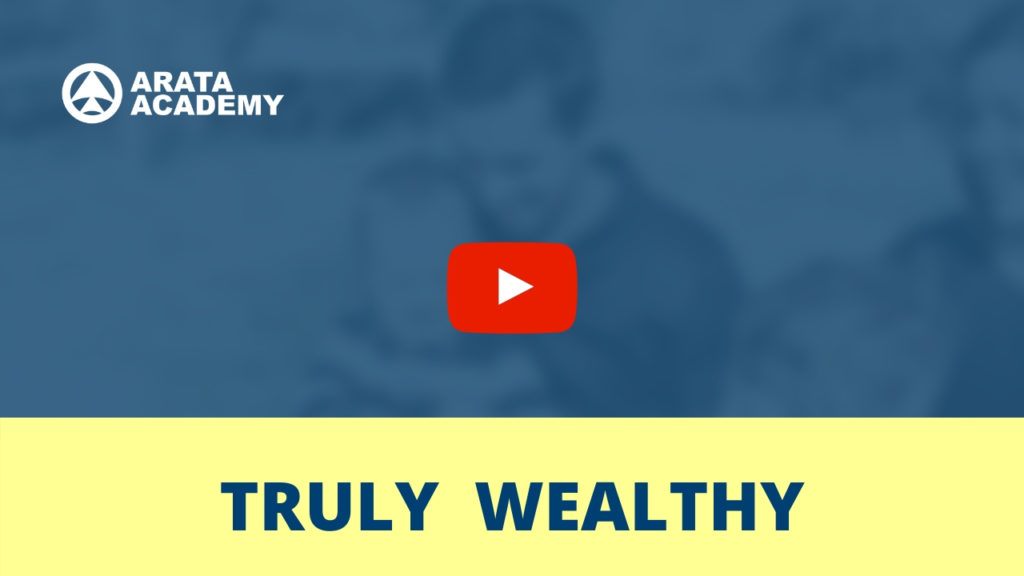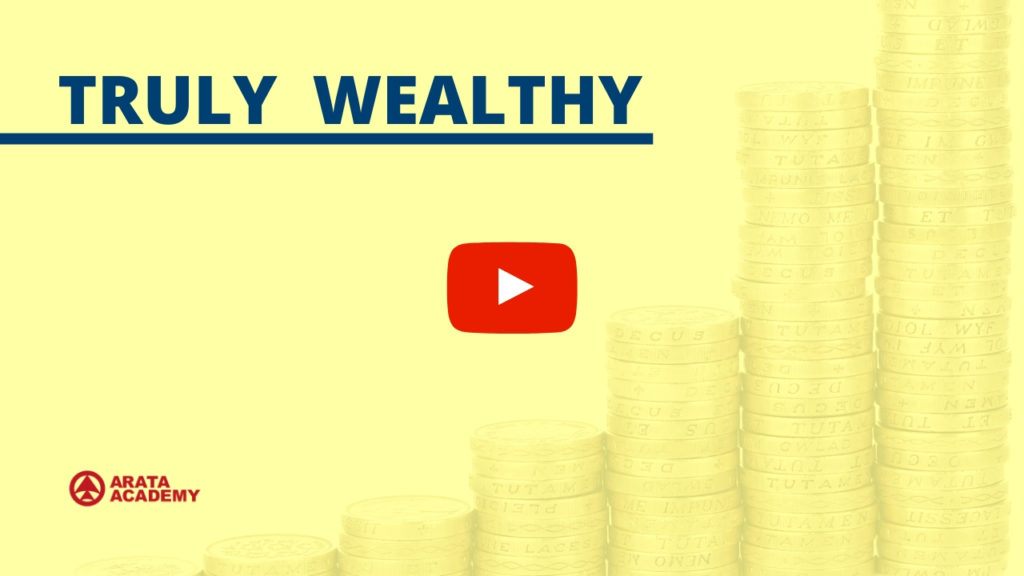Hello! Seiiti Arata. In a little while I’m going to tell you about a film that reminds us of how important it is to stop buying rubbish we don’t need. Can you guess the name of the film? Pause the video and write the film title in the comment section. This film reveals a trap that can be making you prisoner. That trap prevents you from conquering financial independence. It’s a trap that leaves you feeling insecure in moments of crisis. A trap that makes of you a slave of mediocre jobs, abusive bosses and an unhappy life.
The trap is you increasing your expenses and your living standards as you progress in your career and earn more money. And, sadly, that’s a behaviour that almost all of us present whenever we earn some extra money.
But there’s a simple way of stepping out of this trap. That way out frees you from the suffering of having to live from wage to wage, frees you from working just to pay the bills and gives you security to take over your financial life.
What you’re now going to get acquainted with is part of a movement that has gained popularity around the world. This movement is known as FIRE: financial independence, retire early. And the central idea of this movement is to learn how to live below your means.
Living under your means frees you from compulsory work and puts you in the way of financial independence.
When we’re finishing college and starting our professional life, our lifestyle is usually very simple. We use public transport, we eat at cheap restaurants and we manage to buy only the essential.
But then we make progress in our careers. We receive a pay rise or we get a new job. And we start adjusting our life standards to the evolution of our income.
When that happens, we end up stuck in the trap of never having extra money. The one who as a new graduate used to spend the ninety percent of his income in bus tickets, food and the rent of a small apartment, now that he’s head of a big company, he spends the ninety percent of his income in luxurious cars, expensive restaurants and a thirty-year mortgage on an expensive and big house.
A lot of people find that natural. After all, we work to improve our living standards, right? The problem is that, if you always spend everything you earn, you’ll never achieve financial independence and you will always be a prisoner of your own work.
Working just to pay the bills is a prison in disguise. Use your work to buy assets instead of material goods.
Why do so many people subject themselves to a job they don’t like? Why do so many people accept to spend time with abusive bosses, exploiting companies and nasty co-workers? Why do so many people give up the best years of their lives to be trapped in an office and only get to retire when they no longer have as much health and energy to enjoy life?
The answer is simple and we all know it: so that we can pay our bills.
We all need money for food, health, housing. That’s obvious and unquestionable.
Nevertheless, which isn’t as obvious and is worth of dispute is the following: What kind of bills are worth paying? What can be considered some rubbish you can stop buying? Could it be that the choices you make today belong to your financial reality? Is it really worth it to subject yourself to certain jobs so that you can pay unnecessary bills?
There’s nothing wrong about wanting to eat better, having access to higher quality services or living in a comfortable house. You only have to ponder the pros and cons of the cost all those things bring into your life.
The thing gets even worse when we start spending money on things we don’t need. Brand clothing, last generation phones, luxurious cars. All that drains our finances and sets for us the trap of having to always work to pay it all.
To look for happiness by buying material goods puts us in a vicious circle. The goods you bought don’t make you happy and you get even sadder for having depleted your financial reserves.
The time has come for me to tell you what the film is (or the book, in case you’ve read it): “Advertising has us chasing cars and clothes, working jobs we hate so we can buy *stuff* we don’t need”. This quote from Fight Club, which became very well known, summarizes very well the trap of adjusting our living standards to our income.
We try to buy our happiness by acquiring material goods. But those material goods never bring to us the lasting happiness we expect them to. And buying expensive objects wastes our financial reserves leaving us exposed to the dangers of unemployment or an economic crisis.
Consumerism ends up locking us in a vicious circle. We exchange a great part of our lifetime working and making personal sacrifices for distractions, for rubbish that isn’t worth all the effort we make.
That lifestyle that involves expensive trips, fashionable clothing, luxurious cars and giant houses is not a need you have. It is largely a need made up by advertising, by companies that want you to consume more and more.
The solution to free yourself from those fake needs is to make the conscious choice of living below your means.
Living below your means doesn’t mean to content yourself with poverty, but to buy what really matters.
Living under your means doesn’t mean contenting yourself with a mediocre life full of poverty and sacrifices. That’s not what the FIRE movement supports for you to achieve economic freedom.
You have to reflect on the following: If you were able to have an acceptable living standard when you used to earn X, why not maintain that living standard now that you earn 2X?
Instead of spending that extra money on clothing, gadgets and other rubbish, why don’t you buy your own freedom? Instead of buying debts, things that take money out of your pocket, why don’t you start buying assets, things that put money in your pocket?
Living below your means is exactly the opposite of contenting yourself with little. It’s thinking big, it’s looking for the greater objective, which is having financial security to make whatever you wish for your life.
You can stop working out of obligation within five years if you manage to live below your means.
A lot of people believe financial independence to be something impossible to achieve. But that freedom is only impossible for those who don’t invest in their future.
Financial independence happens when you saved such an amount of money that, when well invested, it generates a passive income that allows you to live from the investment returns without having to work anymore.
A large proportion of people who achieve financial independence continue working. But those financially free people only work on what they really like. Then they end up working much better, because they’re usually doing something meaningful, something that has a great personal relevance. And by working better, they manage to earn even more money.
I’m going to give you an extreme example for you to understand: No matter how much you earn today, you could retire in only five years if you managed to live way below your means. Applying the Pareto Principle, if you managed to live on twenty percent of your income and you saved the rest, within five years, you wouldn’t be required to work.
From there on, you could work only on what you like. You wouldn’t fear unemployment or economic crises. You wouldn’t need to depend on your job to pay your bills. You could take a gap year or never again work for money if you didn’t want to.
How is that possible? Let’s say you’re making one thousand dollars and you can live on just two hundred dollars per month. You invest the extra eight hundred and get a very modest net income, of just half a percent per month. Within five years, that money you saved already covers the two hundred dollars you need for living. No matter how much you earn, if you manage to live on just twenty percent of your income, you get to retire within five years.
That’s only an example. Please, don’t focus on numbers, but on proportion. In the FIRE movement, for example, the average is to live with half of your income, which would take you to financial independence in twenty years, more or less.
Living below your means is not diminishing your living standard. The secret is to increase your income and keep your current living standard.
I’m almost sure that today you can’t live on just twenty of fifty percent of your income. Even if you reduce your expenses to the essential, even then, for most people that’s an unreachable objective.
The solution, therefore, is not that you reduce a lot your living standards. You don’t need to give up coffee, stop going to the cinema or spend ten years using the same clothes. You just need to let go of the unnecessary expenses and rethink your consumption habits.
Instead of trying to live on uncomfortable living standards, you must focus on increasing your income. Let’s say that today your essential spending needs consume almost all of your income. The more you increase your income, the less those expenses will have a relative impact in your budget. If you managed to earn five times what you earn today, your expenses would constitute twenty percent.
All you need to do is to maintain your living standards while your income increases. That extra money you’ll be receiving must be used not to buy a new cell phone, but to buy your own freedom.
Even if you don’t achieve financial freedom in five years, the important thing is that you understand the principle. The deadline can be in six, nine, ten, twenty years. The more you manage to increase your income without raising your living standards, the fastest you’ll have the security of being able to stop working out of obligation.
And even if you don’t achieve a complete financial independence that allows you to retire early, you surely will have a financial reserve to deal with situations of unemployment, economic crises, or any other unexpected event that might appear in your life.
This is the typical win/win scenario. You get rid of consumerism, start valuing what is really important in life and, on top of that, you gain a security that allows you to face any difficulty that might come.
Now you can be thinking that all this makes sense, but that it’s impossible for you to increase your income. Your job isn’t well paid, the market is in crisis, you aren’t good enough.
All these thoughts are the result of a mindset you can change. You can gain knowledge, learn new abilities and start to think and act like a rich person. Those are taboos that you can break.
If you’re interested in taking control of your financial future, I invite you to watch a special class from the Truly Wealthy course about financial taboos by accessing this link here.

